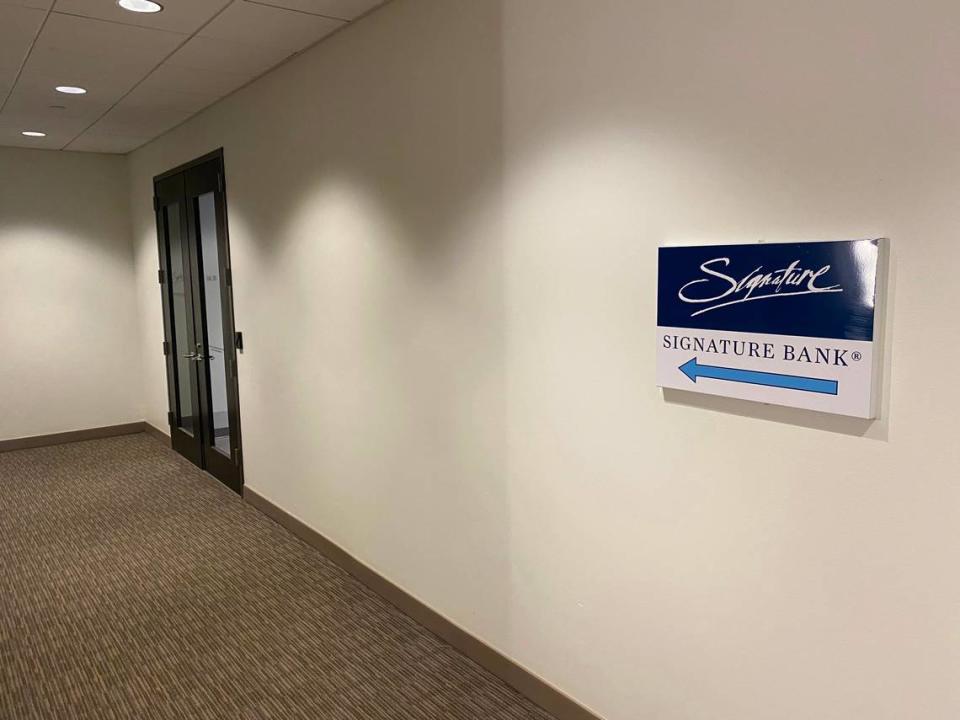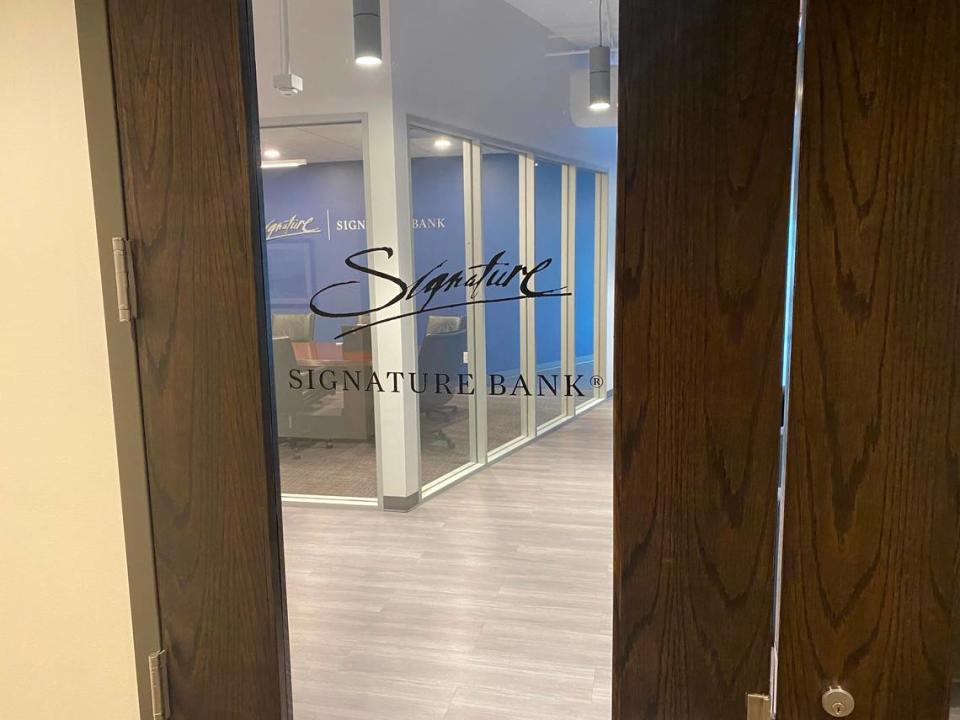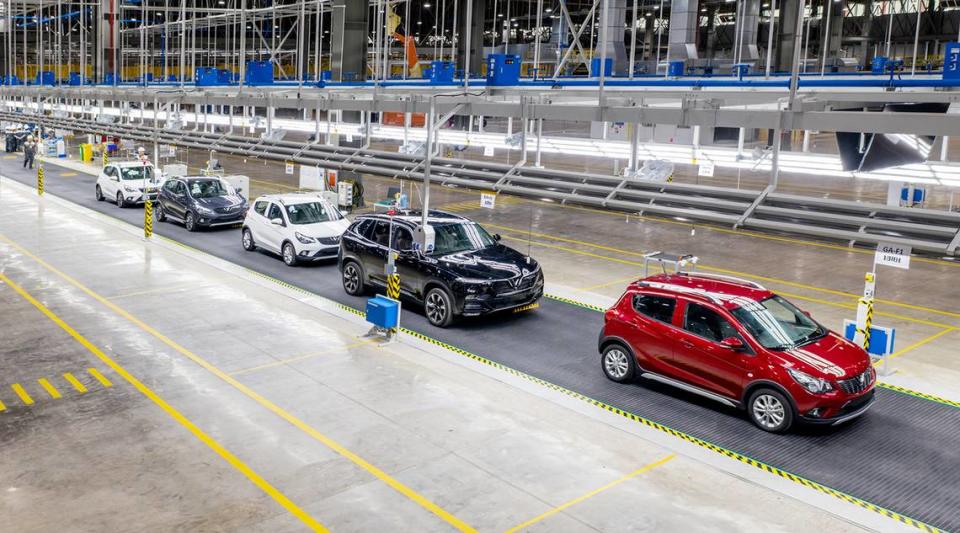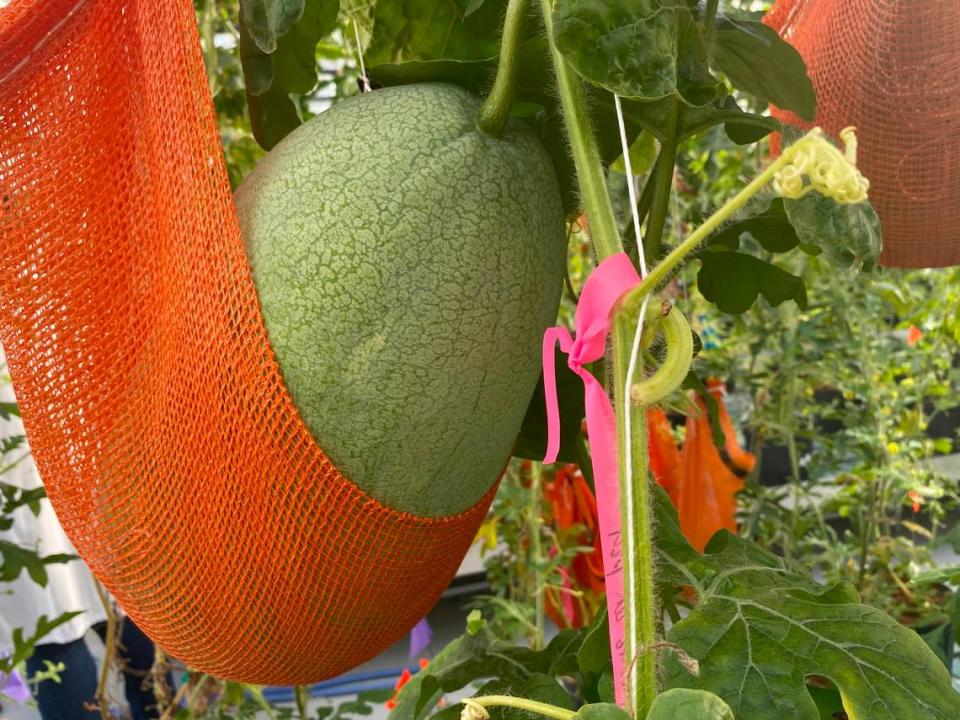Open Source: Where will the Triangle bank now?
I’m Brian Gordon, tech reporter for The News & Observer, and this is Open Source, a weekly newsletter on business, labor and technology in North Carolina.
On Monday, I drove into downtown Durham to see a failed bank.
I didn’t know what I’d see at the local office of Signature Bank. It was the day after it became the third-largest bank to collapse in U.S. history, falling on the heels of the Silicon Valley Bank failure last Friday. Would there be a mass of panicked customers banging on glass, demanding deposits? Boarded up windows with tumbleweeds rolling by?
The third-floor office was quiet but open. A staff member welcomed me in and acknowledged it had been “quite the weekend.” She then assured everything was “business as usual” at the bank, which was no longer technically Signature Bank but a temporary, government-created entity called Signature Bridge Bank, N.A.

Now, there was a zero percent chance everything at Signature was running exactly as usual.
The banking industry had just gone through four days of turmoil. There were bank runs, fear of more bank runs, locked down accounts, and Triangle companies scrambling to find ways to pay their employees. Neither bank was geared toward personal accounts, but the state pension fund could lose millions from its exposure to Signature and Silicon Valley stocks.
But what the employee meant by “usual” is that Signature services were uninterrupted thanks to the federal government stepping in on Sunday and guaranteeing all depositors’ funds at the two failed banks. In a sense, this federal protection makes Signature and Silicon Valley the safest banks in the country. The new Silicon Valley (Bridge) CEO even urged clients this week to deposit more money into the bank.
That’s obviously a steep ask at this moment. A pair of startup founders I spoke to on Monday said they would withdraw all their money from these banks.
Alex Lassiter, whose Raleigh startup had its primary account at Silicon Valley, said going forward he’ll utilize two company accounts, one at a major institution he perceives “too big to fail” (think Chase or Bank of America) and another at a more regional bank that caters to small businesses.
Joe Colopy, a partner at the software-focused fund Jurassic Capital in Durham, agreed startups may “start leaning toward larger, more diversified banks.”
But many worry a shift toward larger financial institutions could doom community banks that offer small businesses services the biggest banks don’t.
“We need banks that actually do understand startups and the startup funding environment, whether it’s for lines of credit, whether it’s for venture debt, or even if it’s for network connections into the broader venture community,” Bill Spruill, a prominent local entrepreneur and investor, said Thursday.
Spruill recommended people be calm.
“I think everyone needs to take a breath and just recognize that stability is dependent upon the depositor base remaining stable,” he said. “Continue to take a breath, frankly, and support local.”

VinFast’s overly bold schedule
Last Friday, the Vietnamese automaker VinFast confirmed it won’t start producing cars in North Carolina until 2025. The company originally said its facility in Chatham County — which will be its first assembly plant in North America — would open by the middle of next year.
The postponement isn’t a shock: The $4 billion project was only announced last March, and construction hasn’t begun. I’ve heard more than one person in state government suggest VinFast’s timeline was bold, perhaps overly so.
VinFast, which seeks to break into the U.S. market with fully electric SUVs, said it needs “more time to complete administrative procedures.” Chatham County said the company still needs to obtain local building and stormwater permits for its 2,150-acre site southwest of Raleigh.
Per its agreement with North Carolina, the company says it will employ 7,500 people and invest billions into the electric vehicle car and battery plant by 2028. But that is only the original plan.
On March 1, VinFast delivered its first 45 SUVs to American customers. It obviously has a long way to go to gain a foothold in the market, and we’ll keep tracking how it does.

Duke students or Duke workers (or both)?
Are graduate students who teach classes and assist in labs workers or students?
Today is the deadline for Duke University to officially send its answer to the National Labor Relations Board. Last Friday, Duke confirmed it will seek to take a uniquely firm stance against the Ph.D. student unionizing drive on its campus, contending these graduate students don’t have a right to unionize because they “are not employees.”
Doctoral students pursue their own research and don’t pay tuition but they also perform jobs and get paid by the university. This year, Duke’s Ph.D. stipend is $34,660, which will rise next year to $38,600.
While an administration opposing a union isn’t unusual, few (if any) universities have recently posited that grad students don’t have the right to unionize said Jeff Hirsch, a UNC labor law professor.
“I am not aware of another school doing this, but it’s possible I’ve missed it,” Hirsch said.
Short stuff: Mutant watermelons
Under Armour is excited about what its working on at N.C. State, but it’s keeping it a secret.
A Durham startup seeks to produce monk fruit-inspired sweetener by genetically modifying other fruits and vegetables (primarily watermelons).
On Tuesday, the state ended incentive agreements with Xerox in Wake County and Labcorp in Durham. Both companies requested to be released from their deals, citing different reasons.
Epic Games, the Cary-based creator of Fortnite, must officially cough up more than half a billion dollars, as the Federal Trade Commission finalized penalties against the company first levied in December. One of the penalties was for “dark patterns to trick players into making unwanted purchases.”

National Tech Happenings
Meta cuts 10,000 more jobs in what CEO Mark Zuckerberg called his company’s “year of efficiency.” No word yet if the company’s expansion into Durham will be affected.
A new version of ChatGPT has been released. Its makers say the large language model is more intelligent thanks to a new algorithm. Updated countdown to A.I. taking over the world: 72 days.
Twitter is adding bookmarks as a metric. No one knows why.
Thanks for reading!
If you have a news tip, feel free to reach out to me at bgordon@newsobserver.com or send a text/Signal to 919-861-1238.
This story was produced with financial support from a coalition of partners led by Innovate Raleigh as part of an independent journalism fellowship program. The N&O maintains full editorial control of the work.
Open Source
Do you enjoy Triangle tech news? Subscribe to Open Source, The News & Observer's weekly technology newsletter and look for it in your inbox every Friday morning. Sign up here.

